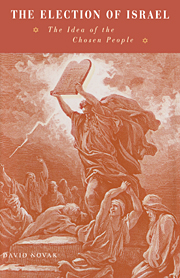Book contents
- Frontmatter
- Contents
- Preface
- List of abbreviations
- General note
- Introduction
- 1 Spinoza and his challenge
- 2 Hermann Cohen's concept of election
- 3 Franz Rosenzweig's return to the doctrine
- 4 The retrieval of the biblical doctrine
- 5 The rabbinic development of the doctrine
- 6 Two medieval views of election
- Conclusion
- Appendix 1 Some major Jewish thinkers cited
- Appendix 2
- Appendix 3
- Appendix 4
- Bibliography
- Index
3 - Franz Rosenzweig's return to the doctrine
Published online by Cambridge University Press: 18 December 2009
- Frontmatter
- Contents
- Preface
- List of abbreviations
- General note
- Introduction
- 1 Spinoza and his challenge
- 2 Hermann Cohen's concept of election
- 3 Franz Rosenzweig's return to the doctrine
- 4 The retrieval of the biblical doctrine
- 5 The rabbinic development of the doctrine
- 6 Two medieval views of election
- Conclusion
- Appendix 1 Some major Jewish thinkers cited
- Appendix 2
- Appendix 3
- Appendix 4
- Bibliography
- Index
Summary
THE PHILOSOPHICAL PREPARATION
In its classical form, the doctrine of the election of Israel clearly designates a direct relationship between God and Israel: God elects Israel. Everything else within the content of that relationship gets its meaning from that foundational reality. Accordingly, election is not a symbolic rendition of something essentially prior to it. God's act of electing is not a metaphor for the act of someone else; Israel's being elected is not a provisional state for the sake of someone else. Thus any attempt to return to the doctrine in its classical form, as enunciated in Scripture and by the Rabbis, must undo the whole modern project of making God's election of Israel an essentially indirect relationship, so indirect that in the end it is not really God who elects and it is not really Israel who is elected. Because of the predominance of this modern view of election, originating as we have seen in Spinoza's powerful inversion, only the most profoundly philosophical effort can retrieve it for us. Any attempt to achieve this retrieval by simply reasserting the ancient doctrine will inevitably present it as some form of tribalism or chauvinism. When this has been the case, the modern view of election can easily re-present itself as being more compelling by far than the ancient doctrine – so crudely presented, that is. For the modern inversion seems to be able to explain by its own categories the classical data more cogently than the ancient doctrine could ever do alone.
For a number of reasons, Franz Rosenzweig (1886–1929) can be seen as the turning point, the pivotal figure, in modern Jewish thought.
- Type
- Chapter
- Information
- The Election of IsraelThe Idea of the Chosen People, pp. 78 - 107Publisher: Cambridge University PressPrint publication year: 1995



